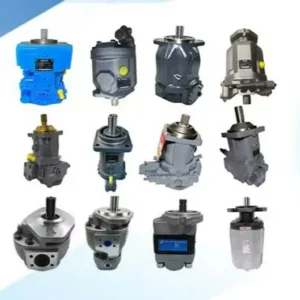Hydraulic valves play crucial roles in controlling the flow, pressure, and direction of hydraulic fluid within a hydraulic system. Their primary functionalities include:
Flow Control:
- Flow Regulation: Controlling the rate of fluid flow through the system, adjusting it to match specific equipment or process requirements.
Pressure Control:
- Pressure Regulation: Maintaining or adjusting hydraulic pressure levels within the system to ensure safe and optimal operation.
Directional Control:
- Flow Direction Management: Directing the flow of hydraulic fluid to specific components or actuators, enabling precise movement or operation.
System Isolation:
- Component Isolation: Shutting off or isolating specific parts of the hydraulic system for maintenance, repair, or safety purposes.
Load Holding:
- Load Stability: Holding loads in place by locking hydraulic actuators or preventing hydraulic fluid from flowing back under load conditions.
Sequence Control:
- Sequential Operations: Initiating and controlling sequential operations in complex hydraulic systems, ensuring proper order and timing.
Safety and Overload Protection:
- Overload Prevention: Protecting the system from overpressure or overload situations, preventing damage to components or equipment.
Fluid Diversion and Distribution:
- Fluid Routing: Diverting fluid to various components or subsystems within the hydraulic system as needed for different operations.
Remote Control and Automation:
- Remote Operations: Facilitating remote control or automation by integrating with control systems for efficient and precise operations.
Manifold Integration:
- System Integration: Mounted on hydraulic manifolds to consolidate valve functions, optimizing space and system design.
Hydraulic valves come in various types (e.g., directional control valves, pressure control valves, flow control valves) and configurations, each serving specific purposes within the hydraulic system. Their functionalities are integral in regulating, directing, and controlling the flow of hydraulic fluid to ensure the proper operation and performance of hydraulic machinery and equipment.
Can hydraulic valve be customized for specific industrial requirements?
Yes, hydraulic valves can be customized to meet specific industrial requirements based on the unique needs of the application or machinery. Customization allows for tailored solutions that optimize performance, hydraulic valve manufacturers efficiency, and functionality within a hydraulic system. Here’s how customization works:
Tailored Specifications:
- Flow Rates and Pressures: Adjusting flow rates or pressure ratings to match the requirements of the equipment or process.
Material Selection:
- Specific Materials: Choosing materials based on environmental conditions or fluid compatibility to enhance durability or resistance to corrosion.
Valve Configurations:
- Valve Types and Designs: Designing or selecting specific valve types (directional control, pressure control, etc.) to suit operational needs.
Mounting and Integration:
- Mounting Options: Customizing mounting options to integrate seamlessly into existing systems or equipment.
Port Sizes and Configurations:
- Port Sizes and Arrangements: Modifying port sizes or configurations to align with the hydraulic system’s layout or requirements.
Functional Adjustments:
- Specialized Functions: Incorporating special functions or features required for unique industrial processes or machinery.
Automation and Control:
- Integrated Controls: Customizing valves to enable integration with automated control systems or remote operation.
Compliance and Standards:
- Regulatory Compliance: Ensuring that customized valves adhere to industry-specific regulations and safety standards.
Testing and Validation:
- Performance Validation: Conducting tests and validation procedures to ensure that customized valves meet performance and safety criteria.
Application-Specific Requirements:
- Addressing Unique Needs: Designing valves to address specific challenges or limitations within a particular application or industry.
Customization of hydraulic valves allows manufacturers or suppliers to work closely with industrial clients, understanding their specific needs and tailoring solutions that optimize performance, efficiency, and reliability within their hydraulic systems. This flexibility in design and configuration enables the adaptation of hydraulic valves to diverse industrial applications and environments.
